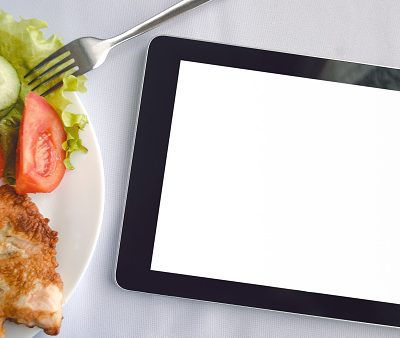Their key drivers include reducing food waste in line with the Trust sustainability strategy, significant associated cost savings and patient safety solutions in relation to food allergy. To achieve these collective goals, the group explored the option of introducing an electronic meal ordering service for patients.
The team set up trials to review whether the current paper-based meal ordering process could be replaced with a digital solution which would enable patients to order their meals electronically on the same day they would be consumed.
Understanding the Problem
Currently patients order their meals via paper menus, selecting their meals the day before they eat. This method leads to significant food waste as patient numbers and transfers can change considerably over a 24-hour period. It is difficult for patients to decide what they would like to eat a whole day before they receive their meals. The current paper-based system is also problematic from a patient safety perspective as food allergen information can be missed; a digital solution would significantly reduce this risk.
The team utilised improvement techniques from the Institute of Healthcare Improvement (IHI) to test their perceived proof of concept of an electronic meal ordering system across the Trust.
This involved designing and running PDSA tests of change for the following areas:
- Meal ordering via an App to test if meals can be successfully ordered digitally from a designated ward. They used the current RVI ‘Food to Go’ App for a small group of staff to order a meal which was successfully delivered to the ward and staff views were evaluated.
- Testing the catering processes to see if they could support same day meal ordering using the current paper-based system on one ward (Ward 7 at Freeman). This proved successful with a small number of patients and evaluated well. Results showed a significant reduction in the length of time between ordering and receiving a meal, down from the current 24-27 hours to 2-3 hours.
The team plan to run further tests of change using electronic meal ordering software when IT support is in place.
Improvements made
Although we continue to have a paper-based meal ordering system at present, the IHI journey has enabled the team to work together on small scale tests of change in a real and live environment.
The team have consulted with and involved staff from various wards and departments within these tests of change which has reinforced and strengthened the need for an electronic meal ordering system to enable these improvements of patient safety, improved quality of service delivery and patient satisfaction, together with cost reduction and environmentally sustainable changes across the Trust.
A digitalised system would also support menu reviews and catering ordering systems and act as a platform for real time patient feedback together with an information platform to share nutrition and hydration information and patient education.
The following quotes were received from patients and staff:
Current meal ordering system (1 day in advance):
Patient – “I did not know what I wanted to eat in 26-30 hours time”
Patient – “You forget what you were getting”
Staff – “Patients aren’t happy about ordering the day before”
Staff – “It gives new admissions a choice with meals – whereas before they get leftover trays with no variety”
Same day ordering system:
Patient – “I had a much better idea of what I wanted to eat in 2-3 hours “
Staff – “By ordering on the same day you improve patients overall stay. They will know what they have ordered and will enjoy it”
Staff – “It would probably take an hour for lunch and for evening. Will be brilliant when electronic.”
Staff – “Anything that reduces food waste is a benefit”
James Callaghan, Head of Nutrition & Dietetics and Co-chair of the Trust Nutrition Steering Group, said: “Being part of the IHI Improvement Teams Programme has provided our team with the knowledge and skills to apply to the future implementation of an electronic meal ordering system within the Trust. We have designed and tested various tools and developed resources such as Standard Operating Procedures and evaluation questionnaires which we can replicate as part of the roll out once the wider project has been approved.”
